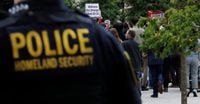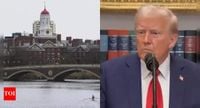The streets of Massachusetts are once again the stage for a high-stakes showdown between federal authorities and local officials as Immigration and Customs Enforcement (ICE) launches Operation Patriot 2.0, a sweeping initiative targeting undocumented immigrants with criminal records. The operation, which began in early September 2025, is the latest salvo in a deepening national debate over immigration enforcement, sanctuary city policies, and the limits of federal power.
According to the Department of Homeland Security (DHS), Operation Patriot 2.0 is designed to "apprehend the worst of the worst criminal illegal aliens living in the state." The initiative follows closely on the heels of a similar enforcement surge in May 2025—Operation Patriot—that resulted in nearly 1,500 arrests statewide. The new operation kicked off in Boston but has quickly expanded to surrounding communities, with ICE agents already spotted in the town of Clinton, as reported by NBC10 Boston and corroborated by The New York Times.
Federal officials have made no secret of their intent. In a statement provided to NBC10 Boston, a DHS spokesperson lambasted Boston's longstanding sanctuary policies, accusing city leaders of "attracting and harboring criminals" and "placing these public safety threats above the interests of law-abiding American citizens." The spokesperson went further, claiming, "ICE is arresting sex offenders, pedophiles, murderers, drug dealers, and gang members released by local authorities." The message from Washington is clear: the Trump administration is determined to ramp up enforcement, particularly in so-called sanctuary jurisdictions that limit cooperation with federal immigration authorities.
The operation's focus extends beyond Boston's city limits. A U.S. official familiar with the matter told The New York Times that many of those released from Boston-area jails under sanctuary policies actually reside in neighboring towns, necessitating a broader sweep. The official also revealed that the operation is expected to last several weeks, though precise details about the number of agents involved or the full list of targeted communities remain undisclosed.
The federal crackdown has not gone unanswered. Boston Mayor Michelle Wu has emerged as a vocal defender of the city's sanctuary stance, insisting that these policies are essential for building trust within immigrant communities and ensuring public safety. In a statement to NBC10 Boston, Wu declared, "This country was born facing down bullies, with Bostonians leading the way. Today Boston is the safest major city in the country because we have worked to build trust in the community, so that everyone feels safe seeking help or reporting a crime. We will not be bullied or intimidated into abandoning the efforts that make Boston a safe home for everyone." Wu's remarks echo her testimony before Congress earlier this year, where she argued that sanctuary laws support both safety and fairness.
The collision between city and federal priorities has spilled into the courts. The Department of Justice recently filed a lawsuit against the City of Boston, Mayor Wu, and Police Commissioner Michael Cox, seeking to overturn the Boston Trust Act. This local ordinance restricts the ability of Boston police to assist ICE in civil immigration enforcement except under specific circumstances. U.S. Attorney General Pam Bondi did not mince words in her statement: "The City of Boston and its mayor have been among the worst sanctuary offenders in America—they explicitly enforce policies designed to undermine law enforcement and protect illegal aliens from justice. If Boston won’t protect its citizens from illegal alien crime, this Department of Justice will."
For ICE, the operation represents a continuation of a broader strategy. Acting ICE Director Todd Lyons told a Boston-area radio show in August, "We’re going to keep making Boston safe, as she’s failing to do with the sanctuary city policies. Now you’re going to see more ICE agents come to Boston to make sure that we take these public safety threats out, that she wants to let go back in the communities." ICE's enforcement cadence in Massachusetts has intensified throughout 2025, with 370 arrests in March (including 165 so-called collateral arrests of non-targeted individuals) and nearly 1,500 arrests in May, according to The New York Times and NBC10 Boston.
The ripple effects of Operation Patriot 2.0 are being felt far beyond the realm of law enforcement. In Cambridge, a recent incident involving Leidy Torres Castano, who was arrested for petty theft and released after local police declined an ICE detainer, only to be picked up by ICE hours later, illustrates the persistent tension between local sanctuary policies and aggressive federal enforcement. The Harvard Crimson reports that ICE-marked vehicles have been spotted near Harvard Square, stoking anxiety among students and immigrant-heavy neighborhoods. The presence of federal agents near major universities has raised questions about the safety of international and undocumented students, placing academic institutions at the heart of the political and legal battle.
Immigrant rights groups warn that federal operations often sweep up individuals with minor or no criminal records, despite the stated focus on "dangerous criminals." In the first phase of Operation Patriot, about half of the nearly 1,500 people detained were so-called collateral arrests, according to The Harvard Crimson and NBC10 Boston. These concerns are echoed by community leaders, who argue that the enforcement surge undermines trust between law enforcement and vulnerable populations, making it less likely that crimes will be reported or witnesses will come forward.
Governor Maura Healey's office, when contacted by NBC10 Boston, had not yet released a statement regarding the operation. Meanwhile, Mayor Wu’s administration is reportedly preparing for the possibility of further federal escalation, including the potential deployment of the National Guard. Wu has stated that her team is "reviewing relevant legal precedents and working very closely with community members to ensure people know what’s happening and that this is not something that is needed or wanted or legally sound."
Federal officials remain steadfast. One DHS spokesperson, quoted by The New York Times, issued a stark warning: "If you come to our country illegally and break our laws, we will hunt you down, arrest you, deport you, and you will never return." The message is unmistakable—Operation Patriot 2.0 is intended as both a practical enforcement action and a symbolic statement about the administration’s zero-tolerance approach to immigration violations.
As Operation Patriot 2.0 unfolds, Massachusetts finds itself at the epicenter of a national reckoning over immigration, public safety, and the boundaries of local versus federal authority. The outcome of this latest confrontation may well set precedents for other cities and states grappling with the same contentious issues.
For now, the people of Boston and its neighboring communities—immigrants, students, law enforcement, and elected officials alike—are left to navigate the uncertainty and anxiety that come with being on the front lines of America’s immigration debate.



